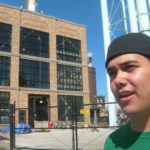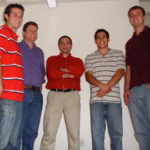Most people never get a chance to live in a high-rise apartment in downtown San Diego; Donna Fabbri can’t wait to tear hers up, and all in the name of sound quality. Donna has been in the audio/visual industry for thirty years, specializing in design solutions for audio/visual equipment. Her home is a testament to her own work. She proudly displays many pieces of what seem to be regular furniture, but in fact contain component audio equipment.
Donna began as a housewife answering phones from home, and has flourished to become a consultant capable of bridging the divide between the audio/visual world and the world of design. Through experience, Donna overcame the stereotypical doubts cast upon woman in the professional world, and found her voice to carry over the professional din. An audiophile with a passion for solving problems, Donna has taken full advantage of her opportunities and has now found herself in high demand.
Her standard email valediction reads something like a prayer: “May you always hear the music.” The wish is a bit of a misnomer, however, because what Donna does is more than that. More appropriate, perhaps, would be “May you always hear the music, and wonder from where it comes.”
Interview
I had no idea where I was going to be. It’s taken me thirty years of my life.
When I started out, in what I did, and what I do now, is so totally different. And I’m very unique. There’s very few people that, it’s not like it’s brain surgery, it’s just that no one wants to go to either industry and cross over.
He started his company. I ran his company for him. I became his private personal assistant because we started making money. As an assistant, I would be taking notes at meetings. I met all the speaker manufacturers, one on one. I met all the electronic people, one on one. They would be talking together, and little did I know that I was learning the audio video.
When he started making money and having homes, he put me through design school and said that I could pick the designers out and do the A/V with the installers. I had come from both worlds from the very beginning. Nowadays, to merge two worlds together is very hard. An A/V person doesn’t want a designer to come in because it takes a lot of their money, a lot of their time. They have to concentrate on what’s going to go where and how it’s going to go in the room. Audio video people want to sell product, and they want the client out the door.
What I’m trying to teach them is that they’re one entity in one room, and they have to start bridging over and asking questions when a client comes in.
Designers, general contractors, interior designers, architects, I’m teaching them how to work with audio video people. They need to have us as a resource also, and when I say us, it’s from both worlds, but to have as a resource. For a designer to go in and to ask if there’s not going to be audio video is like asking if there’s not going to be a kitchen or a bathroom.
In a nutshell, that’s what I’m doing now. I have a consulting firm. I have my own clients. I have contracts. And the contracts are teaching all of these industries to work together.
What makes you passionate about audio video?
I was 22 when I saw it. Remember, I saw the best of the best coming through. So I loved it. I loved the sound. I loved the visual. I loved what it does from engineering and marketing. I can listen to any kind of music. If I’m awake, music has to be on. I absolutely love it.
I just want someone to show me or take me to some type of music I’ve never heard. I just feel it.
The one problem is if the speakers aren’t clear, I have a problem listening. I want to go up and fix them. That’s the bad part of my passion.
I’m really lucky that I found something that I’m passionate in. I guess one thing, as you get older, you decide what you want to do and why you’re doing it. So I live here in San Diego and all my family is in San Francisco. But I came down here to get my life together. I’ve kind of had a second chance. All of this condo needed A/V done and they started asking me.
In my point of view right now I want to do something that I love and that I’m passionate about and that’s challenging. But also, something that gives me flexibility on time, so that I can go up and see my children. Or have some time off. I don’t do well with the 8-5, cookie cutter type of job.
If you had to pinpoint the one hardest thing that you’ve had to overcome in your career, what would that be?
That I was a woman in the audio visual industry. Because women in the industry were considered as ‘candy.’ And not serious at the time. So that was a hard one for them to realize that I was serious about this, and that I could know as much or more than a man.
I can teach men how to talk to the family and the couples with a more personal attitude. Which a lot of the audio visual people don’t have. They come in, ‘What do you want?’ I want a plasma. Then they leave. They don’t ask anything about the room, if even all that’s needed is a plasma, just show a little bit more personal attention.
So do you overcome that with knowledge?
Experience. Knowledge, experience, I guess they go hand in hand.
I did not realize that I myself was my best product. Or my best asset. Not because of being the natural woman that I am, and then knowing all about the fields.
When did you realize that you were your best product?
Forty. I knew what I had. I realized that my boss knew I had it from the very beginning. I’ll do speeches for 400 people, and it’s all men in the room. They’re extra attentive when a woman is on stage. I’ve had doors open for me with couples. The woman will listen to me, and they’ll say flat out, because I’m a woman.
The one thing in business, in whatever you do, if you’re involved with people, and most people are.
The thing I’ve learned is to try and service the person and being attentive to them is probably your biggest thing.
You were with them for thirty-three years. Did you ever feel tempted to veer off the track?
I did.
If you could go back to when you were 22 years old, and you could tell yourself just one piece of advice, what would you tell yourself at 22?
I think when you have an instinct, or a feel, go for it. And not to be afraid. Don’t be hesitant. Not to do with an attitude. When you’re in meetings, to express something you think and feel because that’s what you’re feeling and experiencing something, and you never know what it means.
I was afraid a lot of times, especially with my Italian heritage. And especially being a woman. I was inhibited to speak up because it was all men in the room. But I had ideas. And I didn’t say them, for awhile.
Another thing I do, carrying from work into my personal life, is that I always want to be looked at as a nice lady. And that I listen to people. All the woman qualities I have, I bring to work also.
Speak up with a really nice attitude. A lot of times people are really boisterous. They assume no one is going to like their idea. So they never talk. If you come with the right attitude and say this is what I feel, and you say it. Who is going to begrudge you for that. It’s just a thought that you have or a feeling.
If you see there is a need for something, other people see that need too.
The only angle for Donna Fabbri is that she used to be afraid to speak, and now she’s gets paid to speak her mind as a consultant. In a male dominated industry, she has carved a unique niche combining service, design, and a love for A/V into a job.






